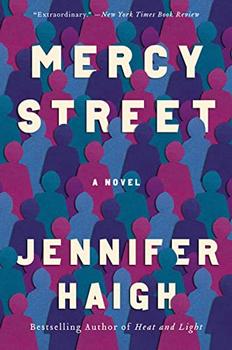Summary | Excerpt | Reviews | Beyond the Book | Readalikes | Genres & Themes | Author Bio

Critics' Opinion:
Readers' Opinion:
First Published:
Feb 2022, 352 pages
Paperback:
Feb 2023, 400 pages
 Book Reviewed by:
Book Reviewed by:
Kim Kovacs
Buy This Book
When Claudia thinks of the trailer, she remembers the carpet—wall-to-wall acrylic shag, the pile so long and dense that it seemed to suck in whatever landed on it. Spilled milk, puzzle pieces, Smarties. Cat food, thumbtacks, melting Popsicles, Lego blocks.
The trailer was fifty feet long and eighteen across. Claudia has lived in smaller places, but never with so many people or such small windows. There was a kitchen and a living room. A bathroom and two tiny bedrooms opened off a narrow hallway. Later, to accommodate the fosters, her uncle Ricky built a flimsy addition, two-by-fours and fiberglass insulation and sloppy drywall, with a skin of Tyvek HomeWrap.
In point of fact, her childhood home was half house, half trailer. They were the sort of people who built onto their trailer.
She can still remember the first time she heard the term white trash. She was nine or ten years old, watching a stand-up comic on television, and she understood immediately that he was talking about people like her. Her family drank cola with dinner, store brand. They ate off paper plates as if each meal were a picnic. This was not a whimsical habit, but a practical one: her mother sometimes couldn't pay the water bill, and for a few weeks each year, there'd be nothing to wash dishes in. The paper plates came in cheap hundred-packs and were so flimsy they used two or three at a time, and as a result they produced vast amounts of garbage. Behind the trailer, under a carport of corrugated plastic, their trash barrels overflowed with it. In summer the smell was overpowering: soggy paper plates and food scraps rotting in the can. As a family they were both an environmental catastrophe and a sanitary one, as poor people often are.
When Claudia heard the words white trash, that is what she thought.
She never found out who that comedian was, or what compelled him to mock what was probably a large share of his audience. Poor people watch a lot of television. Claudia's family was sometimes without water, but they always had an expensive cable package, and her mother always managed to pay that bill on time.
If Deb was at home, the TV was playing. To fall asleep she watched something monotonous, golf or C-SPAN. Every day of her short life began in the chipper company of the network morning shows, with their simpering hosts and human-interest stories and celebrity guests preparing favorite dishes, as though movie stars actually cooked. She was out the door by seven thirty, leaving Claudia to dress and feed the fosters.
The minute her mother left for work, Claudia turned off the TV.
The fosters, Deb called them—as though it were their last name, as though they were brothers and sisters in a large, multicolored (for Maine), ever-expanding family. They had one at a time, then two, and finally three or four. Claudia was in middle school—old enough to babysit—when Deb hit on this way to make extra money. Each month, the state of Maine paid four hundred bucks per kid.
(Could that figure possibly be correct? After her mother's death, Claudia asked her aunt Darlene. "It sounds right," Darlene said, but she didn't sound sure.)
Importantly, each foster increased their monthly allotment of what were inexplicably called food stamps. These weren't actually stamps but paper bank notes, clearly labeled by the federal government: U.S. DEPARTMENT OF AGRICULTURE FOOD COUPON. The food stamps were blue or purple, to make absolutely certain no one would ever mistake them for actual money. It was important to make them look like what they were: government handouts for poor people. They were designed for maximum embarrassment. Times have since changed—single mothers on assistance are now issued debit cards—but back then, no one worried about shaming them. Shame was considered appropriate. Shame, it was felt, might teach them some restraint.
Excerpted from Mercy Street by Jennifer Haigh. Copyright © 2022 by Jennifer Haigh. Excerpted by permission of Ecco. All rights reserved. No part of this excerpt may be reproduced or reprinted without permission in writing from the publisher.





The Flower Sisters
by Michelle Collins Anderson
From the new Fannie Flagg of the Ozarks, a richly-woven story of family, forgiveness, and reinvention.

The House on Biscayne Bay
by Chanel Cleeton
As death stalks a gothic mansion in Miami, the lives of two women intertwine as the past and present collide.

The Funeral Cryer by Wenyan Lu
Debut novelist Wenyan Lu brings us this witty yet profound story about one woman's midlife reawakening in contemporary rural China.
Your guide toexceptional books
BookBrowse seeks out and recommends the best in contemporary fiction and nonfiction—books that not only engage and entertain but also deepen our understanding of ourselves and the world around us.